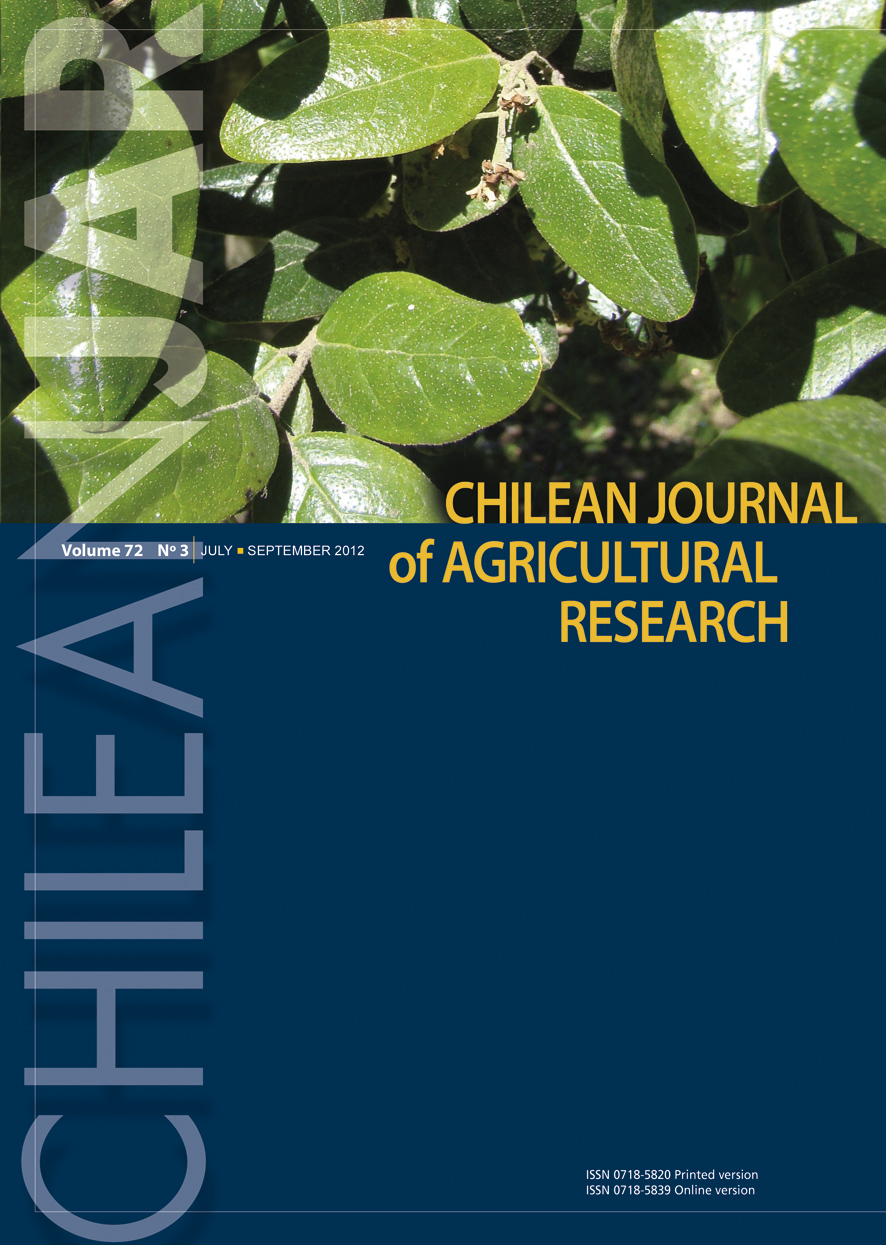
|
Chilean Journal of Agricultural Research
Instituto de Investigaciones Agropecuarias, INIA
ISSN: 0718-5820
EISSN: 0718-5820
Vol. 69, No. 1, 2009, pp. 107-111
|
 Bioline Code: cj09013
Bioline Code: cj09013
Full paper language: Spanish
Document type: Note
Document available free of charge
|
|
|
Chilean Journal of Agricultural Research, Vol. 69, No. 1, 2009, pp. 107-111
| es |
Comparación de Inducción Rizogénica en Explantes Adultos de Avellano Europeo ( Corylus avellana  L.) por Agrobacterium rhizogenes L.) por Agrobacterium rhizogenes  y Ácido indolbutírico y Ácido indolbutírico
Sánchez-Olate, Manuel; Sáez, Patricia; Cartes, Priscila; Alvarez, Carolina & Río, Darcy
Resumen
A partir de material adulto de Corylus avellana L. cv. Negretta cultivado in vitro, se evaluó el enraizamiento adventicio de microtallos, comparándose la inducción rizogénica mediada por dos cepas silvestres de Agrobacteriumrhizogenes (A477 y A478) y ácido indolbutírico (IBA), bajo dos condiciones de luminosidad (fotoperíodo de 16:8 h y oscuridad completa). Los resultados muestran que en la inducción bajo fotoperíodo de 16:8 h, la tasa de enraizamiento con IBA (90%) fue significativamente mayor a la obtenida con la strain A477 de A. rhizogenes (67,7%), mientras que con la cepa A478 no hubo significancia para la misma variable (75%). Por otra parte, bajo oscuridad completa el enraizamiento mediado por IBA (90%) superó significativamente los resultados obtenidos con ambas cepas de A. rhizogenes (40 y 20%, para A478 y A477, respectivamente). En cuanto a las variables morfológicas del sistema radicular resultante, la inducción por IBA bajo fotoperíodo de 16:8 h, generó un número de raíces significativamente mayor (19 raíces por microtallo) que las obtenidas con A. rhizogenes (3,7 raíces promedio por microtallo), produciéndose diferencias significativas al comparar los resultados de la cepa A478 (5 raíces por microtallo) con aquellos de la cepa A477 (2,4 raíces por microtallo). La inducción bajo oscuridad completa no produjo efectos en el número de raíces, independiente del inductor rizogénico utilizado. Por otro lado, la longitud de raíces no presentó diferencias significativas entre tratamientos, excepto en presencia de A. rhizogenes A477 y oscuridad.
Palabras-clave
enraizamiento, Agrobacterium rhizogenes, avellano europeo.
|
| |
| en |
Comparison of Root Induction in Mature Filbert ( Corylus avellana  L.) Explants by Agrobacterium rhizogenes L.) Explants by Agrobacterium rhizogenes  and Indolbutiric Acid and Indolbutiric Acid
Sánchez-Olate, Manuel; Sáez, Patricia; Cartes, Priscila; Alvarez, Carolina & Río, Darcy
Abstract
From in vitro cultured adult material of Corylus avellana L. cv. Negretta, adventitious rooting of microshoots was evaluated. Rhizogenic induction mediated by two strains of wild-type Agrobacterium rhizogenes (A477 and A478) and indolbutyric acid (IBA) were compared under two light conditions (16:8 h photoperiod and complete darkness). The results indicate that in the 16:8 h photoperiod induction, the rooting rate with IBA (90%) was significantly higher than that obtained with the strain A477 of A. rhizogenes (67.7%), while with the strain A478 no statistically significant difference was obtained for the same variable (75%). On the other hand, under complete darkness, rooting mediated by IBA (90%) significantly surpassed the results obtained with both strains of A. rhizogenes (40 and 20%, for A478 and A477, respectively). In terms of the morphological variables of the resulting root system, induction mediated by IBA, with a 16:8 h photoperiod, generates a significantly higher number of roots (19 roots per microshoot) than that obtained with A. rhizogenes (mean 3.7 roots per microshoot), producing significant differences when comparing the results with the strain A478 (5 roots per microshoot) to those of the strain A477 (2.4 roots per microshoot). Induction under complete darkness does not have any effect on root number, independent of the rhizogenic inductor employed. Root length did not present significant differences among treatments, except in the presence of A. rhizogenes A477 and darkness.
Keywords
rooting, Agrobacterium rhizogenes, European hazelnut.
|
| |
© Copyright 2009 - Universidade de Santa Cruz do Sul
Alternative site location: http://www.inia.cl
|
|
